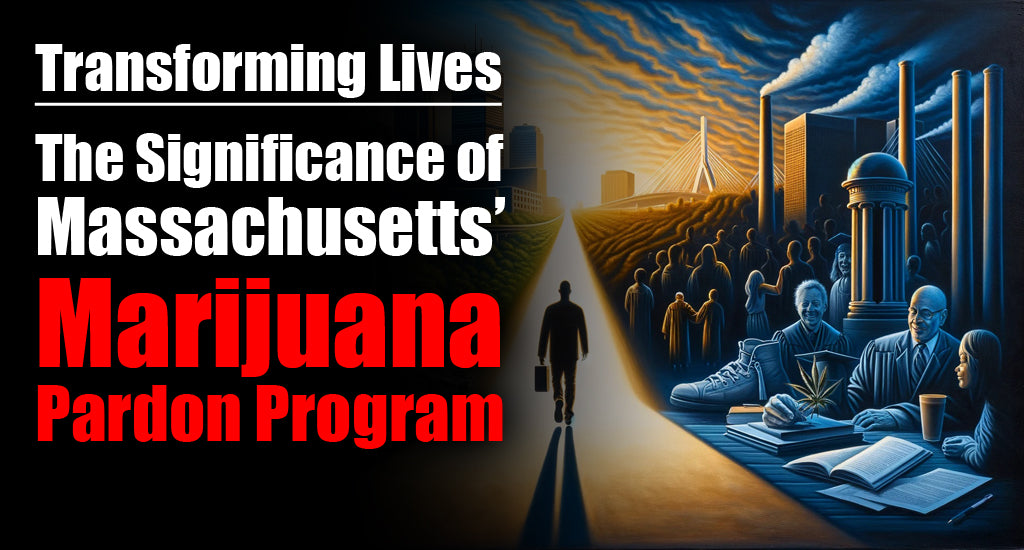
Transforming Lives: The Significance of Massachusetts' Marijuana Pardon Program
In recent years, Massachusetts, alongside a progressive national shift, has been at the forefront of reevaluating its stance on marijuana-related convictions. This article delves into Massachusetts' initiatives to pardon individuals with marijuana charges, shedding light on a broader movement towards justice and fairness in the realm of drug-related offenses.
The conversation around marijuana legalization has evolved significantly, transitioning from strict prohibition to a more lenient approach, recognizing the undue burdens placed on individuals for offenses that are increasingly considered minor or non-issues in many states. Massachusetts has been a notable player in this shift, with Governor Maura Healey implementing new clemency guidelines aimed at addressing past injustices rooted in marijuana convictions.
Description of the Pardon
In a bold move towards justice and equity, Governor Maura Healey's administration has unveiled innovative clemency guidelines, marking a significant shift in Massachusetts' approach to criminal justice. Aimed squarely at dismantling systemic biases, these guidelines offer a beacon of hope for individuals seeking pardons or commutations for past offenses, including those related to marijuana.
At the heart of this initiative is a commitment to fairness. Recognizing the changing societal views on marijuana and its use, the administration is keen on rectifying the adverse impacts of prior convictions. By carefully considering factors such as the age of the petitioner at the time of the offense, their health, post-offense behavior, and whether they have been victims of sexual assault, domestic violence, or human trafficking, these guidelines represent a comprehensive effort to ensure justice is served with compassion and understanding.
In her first 10 months in office, Governor Healey has recommended pardons for 13 individuals, demonstrating a clear dedication to leveraging executive clemency as an instrument of justice. This approach not only addresses the individual cases but also sends a strong message about the state's direction towards a more equitable legal system.
While the exact numbers of those who will benefit from this initiative remain to be seen, the implications are vast. The administration's focus on inclusivity and the acknowledgment of marijuana's evolving legal and social status underline a significant shift towards rectifying past injustices. This initiative promises to open new doors for countless individuals, offering them a second chance and the opportunity to move forward without the burden of a past that no longer aligns with the state's values and laws.
Governor Healey's clemency guidelines set a precedent for a more humane and just approach to criminal justice, signaling a new era in Massachusetts where fairness and equity are at the forefront of legal reforms. This initiative not only aims to transform lives but also to reshape the landscape of justice in Massachusetts, making it a model for other states to follow.
Opposition to the Pardon
To delve deeper into the opposition to Massachusetts' marijuana pardon initiative, it's essential to understand the diverse reasons critics have voiced their concerns. The opposition comes from various sectors, including law enforcement, political figures, certain community leaders, and individuals concerned about the broader implications of such policy shifts. Here are the main points of contention:
-
Public Safety Concerns: Critics argue that pardoning marijuana charges might embolden individuals to engage in drug use or other illegal activities, fearing less repercussion for their actions. There's a concern that this could lead to an increase in drug-related crimes or impair driving safety standards.
-
Signal Sent About Drug Use: Opponents believe that pardoning marijuana offenses sends a message that drug use is acceptable or less serious, potentially undermining efforts to educate youth about the risks associated with drug consumption. They worry about the normalization of marijuana and other substances.
-
Impact on Drug Trafficking: Some argue that easing penalties for marijuana offenses could complicate efforts to combat drug trafficking. By blurring the lines between legal and illegal drug activities, it might become more challenging to enforce laws against more harmful substances or large-scale illegal drug operations.
-
Undermining the Rule of Law: There's a perspective that pardons for drug charges, especially en masse, could undermine respect for the law. Critics argue that it might appear as if laws can be disregarded or that consequences for breaking them are not serious, potentially eroding the legal system's integrity.
-
Potential for Increased Drug Abuse: Concerns have been raised that pardoning marijuana offenses could lead to higher rates of drug abuse, with individuals feeling more liberated to experiment with marijuana, potentially leading to abuse or the use of more dangerous drugs.
-
Impact on Future Drug Policy: Critics are also concerned about how these pardons might affect future drug policy, questioning whether this could set a precedent that complicates the implementation of drug laws or hinders the ability to enact stricter regulations in response to future drug crises.
-
Questioning the Fairness of Retroactive Justice: Some opposition voices raise questions about the fairness of retroactively changing the consequences for actions that were clearly illegal at the time they were committed. They argue this could lead to inconsistencies in how justice is applied and potentially open the door to revisiting a wide range of other convictions.
Addressing Concerns Over Marijuana Pardons in Massachusetts
To counter the opposition points to Massachusetts' marijuana pardon initiative, it's important to articulate a comprehensive rebuttal that addresses the concerns while highlighting the benefits and rationale behind such policy changes. Here's a point-by-point rebattle:
-
Public Safety Concerns: Studies have shown that states with legalized marijuana have not experienced a significant uptick in drug-related crimes. In fact, some research indicates a decrease in violent crimes in areas with legal access to cannabis. It's crucial to differentiate between responsible adult use and criminal behavior, with the focus on regulating and educating rather than criminalizing.
-
Signal Sent About Drug Use: Pardoning marijuana offenses does not signal that drug use is acceptable; rather, it acknowledges the shift in societal attitudes towards marijuana, recognizing its medical benefits and the ineffectiveness of prohibition. Education and prevention efforts can continue, emphasizing responsible use and the potential risks without resorting to criminal penalties.
-
Impact on Drug Trafficking: By legalizing and regulating marijuana, states can actually undermine the illegal drug market, cutting off a significant revenue stream for traffickers. Regulation allows for control over quality, reduces illegal sales, and shifts focus to more serious crimes.
-
Undermining the Rule of Law: Rather than undermining the law, pardons reflect the legal system's ability to evolve and adapt to societal changes. They represent an acknowledgment of the disproportionate impact of past laws and the commitment to fairness and justice.
-
Potential for Increased Drug Abuse: Evidence from states that have legalized marijuana shows no significant increase in marijuana use among teens, and in some cases, reports suggest a decrease. Legalization and pardons are accompanied by regulation and education, aiming to mitigate abuse while recognizing the reality of current usage patterns.
-
Impact on Future Drug Policy: Far from complicating future drug policy, pardons and legalization can provide a more rational, evidence-based approach to drug use. By focusing on harm reduction, public health, and regulation, policymakers can create more effective strategies that address the realities of drug use in society.
-
Questioning the Fairness of Retroactive Justice: The fairness of retroactive pardons lies in correcting past injustices—recognizing that the laws themselves were applied in a manner that was often biased and disproportionate. This approach seeks to heal the wounds of the past, offering a second chance to those disproportionately affected by outdated policies.
Conclusion
In the face of evolving societal norms and legal landscapes, Massachusetts' initiative to pardon marijuana-related offenses emerges as a pivotal moment in the broader pursuit of criminal justice reform. This move, spearheaded by Governor Maura Healey's administration, signifies a profound shift towards a more equitable approach, aiming to rectify the long-standing injustices that have disproportionately impacted certain communities. By adopting comprehensive clemency guidelines, Massachusetts not only challenges the status quo but also sets a precedent for other states to follow, advocating for a justice system that values rehabilitation over punishment and fairness over blind retribution.
As debates around marijuana legalization and decriminalization continue nationwide, Massachusetts' pardoning initiative highlights the critical need for policies that acknowledge the changing perceptions of marijuana use. This approach serves as a testament to the potential for legislative and executive actions to bring about meaningful change, offering individuals a chance at redemption and a brighter future free from the shadows of past convictions. In doing so, Massachusetts not only addresses the immediate needs of those affected by outdated laws but also contributes to the larger dialogue on how we, as a society, can better approach drug policy and criminal justice in a manner that truly reflects our values and advances the cause of justice for all.
Leave a comment
Comments will be approved before showing up.



